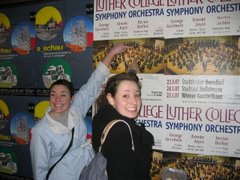About Me
Links
Blog Archive
Monday, February 26, 2007
Over the weekend, I saw a great movie, Music of the Heart, that I thought was relevant to teachers in the public schools. It's particularly relevant to music teachers, which is great since that's why I'm at Luther in the first place. The plot focuses on Meryl Streep's character, Roberta, who decided to give up her dream to be a concert violinist and teach instead because she was told she wasn't good enough. Recently divorced and with two young children, Roberta literally has to beg for a job at an inner-city school teaching violin classes. Her first year was a little rough. The kids were hard to work with and Roberta's fellow faculty members weren't much better. The students, for the most part, came from rough home lives and many were a lot to handle for just one teacher. The other music teacher at Roberta's elementary school was only there to get his paycheck. He was not invested in his students and he was not invested in helping Roberta and seeing her program grow. It also seemed that none of the students' parents cared about what their children were learning. One mother in particular, whose son really did want to learn to play the violin, refused to let him continue in Roberta's class because she did not want him playing music by "dead white men." But despite having the odds stacked against her, Roberta continued to perservere, knowing that she wanted to teach these children to play the violin. She learned to adapt. During one class, when she discovered one of her students wasn't "standing strong" because she had weak ankles, she allowed Guadalupe to sit. In fact, Guadalupe always sat, and neither Roberta nor the other students in the class ever said anything about it. She adapted when it was necessary without making the young violinist feel out of place. When she recieved notice from the administration that she was being too harsh with her students, she tried to make the necessary adjustments in her classroom, although the students did ask her why she was acting so strangely and told her that they preferred the old Roberta better. As the school continues and Roberta becomes more and more involved in the program, she also becomes more and more involved in students' lives. One morning, she walks into school only to discover that one of her violinists was accidentally killed in a drive-by shooting. No one was expected to play that day. Instead, the students sat in a circle with their teacher and she asked if they wanted to talk about it. They agreed that they should play the violin instead. However, a few evenings later, Roberta went to the home of one boy who was particularly upset over the accident. She wanted to know if he was okay or if he needed to talk to her about it. It was this scene that made me realize that Roberta had become much more than a violin teacher, and these kids from the inner city had become much more than her students. A few weeks later, Roberta discovered that the school district's budget cuts would make it impossible for her to continue teaching her violin class, which, by this time, had become wildly popular. With the help of her students and such violinists as Ithak Perlman, Isaac Stern and Joshua Bell, a benefit concert to raise money to keep the program is prepared in only six short weeks. The concert at Carnegie Hall raised over four thousand dollars and helped the program stay alive. It was a feel-good movie and there were a lot of good themes presented. It would be worth the time of any music education major out there to see this movie.
Subscribe to:
Post Comments (Atom)

No comments:
Post a Comment